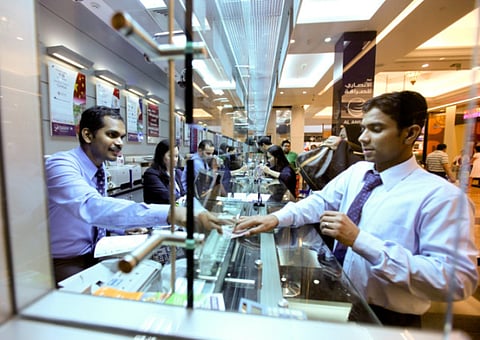Indians in the UAE make hay while the dollar shines
Plenty of reasons for UAE’s white collar workers to remit money home in large proportions

Abu Dhabi: Indians are laughing all the way to the currency exchanges to take advantage of the falling rupee as the World Bank named India the world’s largest recipient of remittances last year.
In the UAE white collar workers are catching up with their blue-collar brethren in the remittance stakes according to the country’s leading exchange houses and financial experts.
According to World Bank reports, India received $69 billion in global remittances last year, significantly higher than China ($60 billion), the Philippines ($24 billion), Mexico ($23 billion) and Nigeria and Egypt ($21 billion each). Other large recipients include Pakistan, Bangladesh, Vietnam and Lebanon.
And the UAE has a significant role to play in that, says Adeeb Ahmed, CEO of Lulu Exchange. “Remittances to India from the UAE have been as strong as ever. In fact, we also have seen a 10 per cent growth in the volume of remittances with expats taking advantage of the depreciating rupee value in the past year,” he said.
One reason is that the UAE remains the cheapest country globally for remitting money. According to Remittance Prices Worldwide data, the global average cost of remitting $200 (Dh735) worldwide was 8.96 per cent in September 2012. But the average to remit the same amount from the UAE to India is 5.02 per cent.
“It’s clear the way our business has grown. Our average ticket size (value per transaction) in 2010 was $635 (roughly Dh2,300) and that went up to $762 (Dh2,800) in 2012,” says Promoth Manghat, vice-president of global operations at UAE Exchange. He says it’s because of the growing earning capacity of Indians. “You just have to take a walk around the business districts of Dubai to see the number Indians taking control in the law, banking and finance sectors today,” he said.
Ranjan Mukherjee, Chief Financial Officer at Khan Saheb Civil Engineering, however puts it down to simple logic. “The dollar turmoil has seen investment market returns go down whereas interest rates in India have gone up considerably for NRE fixed deposits. Many banks are now offering over nine per cent and despite exchange loss, remitting money to India remains a favourable choice,” says the long time Dubai resident. “It’s a win-win situation,” he adds. “The RBI lets NRE fixed deposits to be remitted back without any deduction and what’s more, income from that investment is tax free. So it’s obvious that a lot of white collar job-holders remit money and certainly I am no exception.”
Sign up for the Daily Briefing
Get the latest news and updates straight to your inbox



